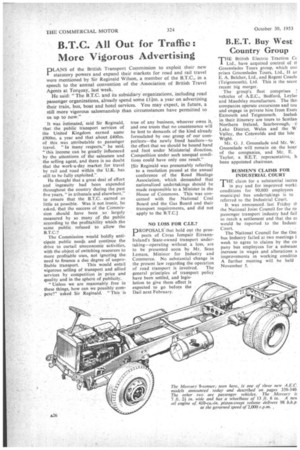B.T.C. All Out for Traffic: More Vigorous Advertising
Page 28

If you've noticed an error in this article please click here to report it so we can fix it.
PLANS of the British Transport Commission to exploit their new statutory powers and expand their markets for road and rail travel were mentioned by Sir Reginald Wilson, a member of the B.T.C., in a speech to the annual convention of the Association of British Travel Agents at Torquay, last week.
He said: "The B.T.C. and its subsidiary organizations, including road passenger organizations, already spend some Llim. a year on advertising their train, bus, boat and hotel services. You may expect, in future, a still more vigorous salesmanship than circumstances have permitted to us up to now."
It was estimated, said Sir Reginald. that the public transport services of the United Kingdom earned same £900m. a year and that about £400m. of this was attributable to passenger travel. "In many respects," he said, "this income can be greatly influenced by the attentions of the -salesmen and the selling agent, and there is no doubt that the work-a-day market for travel by rail and road within the' U.K. has still to be fully exploited.".
He thought that a great deal of effort and ingenuity had been expended throughout the country during the past five years, "in tribunals and elsewhere." to ensure that the B.T.C. earned as little as possible. Was it not ironic, he asked, that the success of the Commission should have been so largely measured by so many of the public according to the profitability which the same public refused to allow the B.T.C.?
The Commission would boldly anticipate public needs and continue the drive to curtail uneconomic activities, with the object of switching resources to more profitable uses, not ignoring the need to finance a due degree of unpro
fitable transport. This would entail vigorous selling of transport and allied services by competition in • price and quality and in the sphere of publicity.
" Unless we are reasonably free in these things, how can we possibly compete?" asked Sir Reginald. "This is true of any business, whoever owns it, and one trusts that no countenance will be lent to demands of the kind already formulated by one group of our competitors—the newly freed hauliers—to the effect that we should be bound hand and foot under Ministerial direction. Competition under such unequal conditions could have only one result."
[Sir Reginald was presumably referring to a resolution passed at the annual conference of the Road Haulage Association, which demanded that nationalized undertakings should be made responsible to a Minister in the House of Commons. This was concerned with the National Coal Board and the Gas Board and their transport requirements, and did not apply to the B.T.C.1




















































































